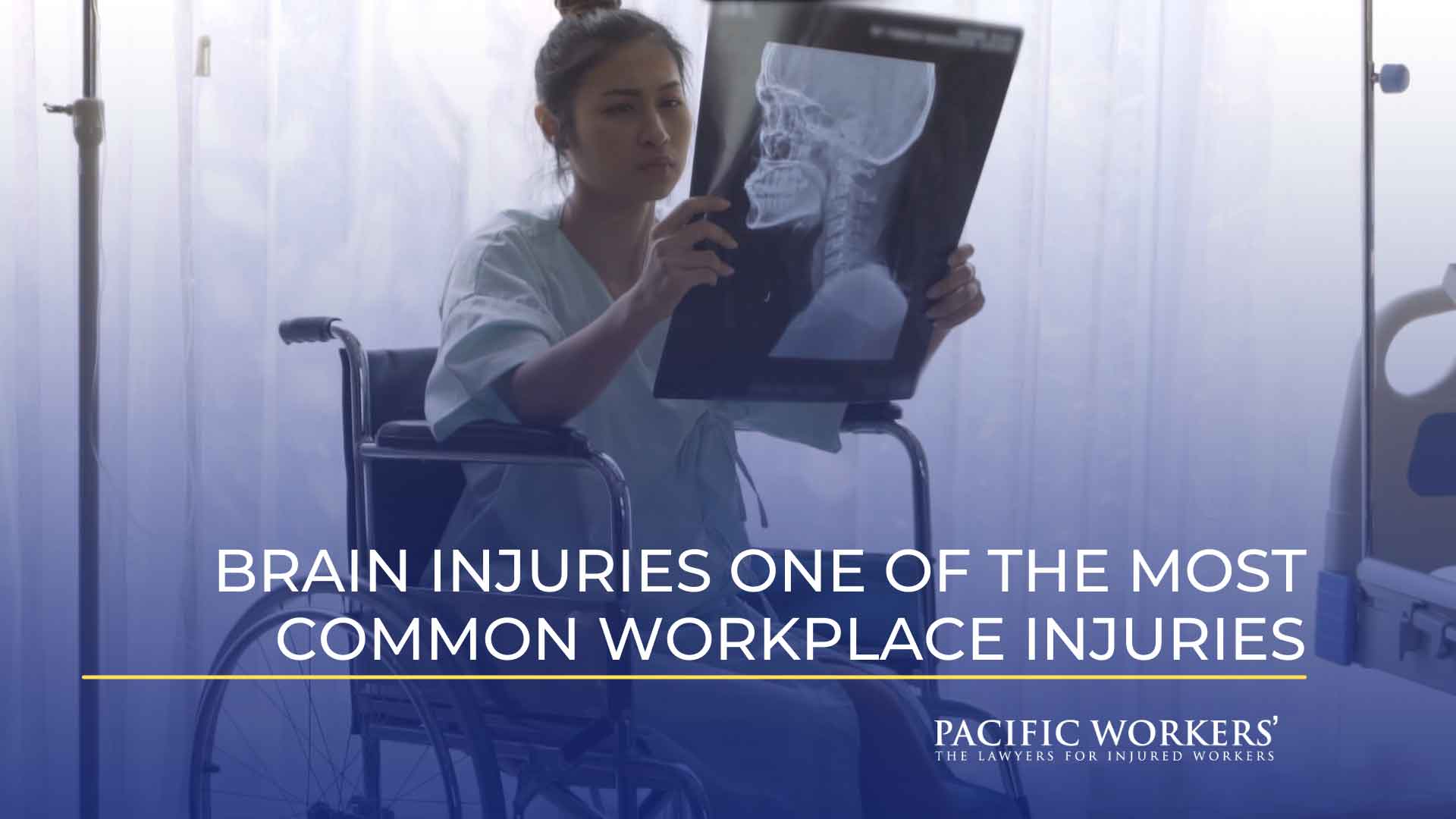Oakland Workplace Brain Injury Attorney
We Don't Get Paid Unless You Do!

Have you sustained a serious brain injury as a result of a workplace accident? If so, we strongly advise you to get in touch with our Oakland brain injury attorney as soon as possible. At Pacific Workers', The Lawyers for Injured Workers, The Lawyers for Injured Workers, we understand the complex and sensitive nature of brain injuries and the devastating, even life-threatening effects they can have on the injured person.
Our brain injury attorneys have more than 130 years of combined experience and have successfully handled thousands of cases. With our supportive assistance and personalized legal solutions in your corner, you can trust our team to deliver effective results, not excuses. We can even help you find a doctor and receive the immediate care and attention that you deserve.
Contact us online or by calling (888) 740-6434 today!
" "Brain Injuries: One of the Most Common Workplace Injuries
"Brain Injuries: One of the Most Common Workplace Injuries
There's more than one kind of workplace accident that can lead to brain injuries. However, falls are easily the main and most common cause. Safety protocols need to be implemented at all times, and good housekeeping needs to be practiced.
Understanding the different types of workplace brain injuries can empower employees and help prevent severe outcomes. From concussions to more severe traumatic brain injuries, each type carries its own set of risks and necessary precautions. Educating employees on recognizing early symptoms can be crucial in seeking timely treatment, minimizing long-term impacts on health and livelihood.
Fall protection is a particular safety protocol that really has to be enforced. Wet areas, spills, and the like need to be addressed as soon as possible. Barring that, employees need to be alerted of the hazardous situation at hand.
Objects that are randomly strewn about are also fall hazards because even tripping on something can be dangerous. A dropped pen, a tool, and even a small box can cause a head injury. In turn, a concussion could occur and, in terms of the worst-case scenario: a traumatic brain injury.
No matter what the circumstances are, work environments can lead to falls. However, it's more likely in some jobs than others. The following industries have a tendency to take the lion’s share of traumatic brain injuries:
- Agriculture
- Construction
- Emergency medical services
- Fishing
- Forestry
- Transportation
Precautionary Measures
Employers need to be able to mitigate risks within their industry. Hazards vary, but the bottom line is the same: safety is key. The last thing any employer should overlook is the ability to keep employees from ending up with brain injuries. Falls aside, many other risks can lead to brain injuries. Equipment mishaps, falling objects, machinery, toxic chemical exposure, and truck accidents are among those risks. There's also a possibility for oxygen deprivation, which usually comes from work in confined spaces.
Employers should also prioritize ongoing safety training and make sure all staff members are aware of the procedures to follow in the event of an accident. Regular drills and interactive safety workshops can significantly enhance awareness and preparedness, thus reducing the likelihood of brain injuries. Moreover, fostering an open safety culture encourages employees to report hazards without fear of retribution, contributing to a safer workplace environment.
People that have a work environment that's high-risk for dangerous instances are entitled to protective equipment. Any major hazards can (and should) be reported to their direct supervisor.
The Occupational Safety and Health Administration (OSHA)
When OSHA regulations are violated, and traumatic brain injuries come as a result, workers’ compensation becomes a right. Moreover, the injured person won't have to worry about employer discrimination if they request for an OSHA inspection. Employers have several responsibilities to their employees under OSHA:
- Daily inspections
- Providing a safe work environment
- Provide safety information to all employees
- Training should be provided
" "Symptoms of a Workplace Brain Injury
"Symptoms of a Workplace Brain Injury
Head injuries are often very serious as they may lead to permanent health complications. Sometimes, head-related injuries are not immediately visible yet they can still cause a great deal of damage to your brain and overall health. Even a seemingly minor impact to the head can cause a brain injury, so it's important to know what signs to look out for:
- Loss of consciousness
- Persistent or worsening headache
- Nausea and/or vomiting
- Dizziness or trouble balancing
- Sensitivity to light or sound
- Chronic headaches or uncharacteristic migraines
- Reduced clarity of vision or sense of smell
- Tinnitus (ringing in the ears)
- Amnesia and memory loss
- Insomnia, or overactive sleep cycle
- Mood swings
View the complete list of brain injury symptoms from the CDC
Recognizing these symptoms early can be lifesaving, as some brain injuries require immediate medical intervention to prevent further health deterioration. Treatment may involve a series of evaluations, imaging tests, and consultations with specialists to ensure that all potential issues are adequately addressed. Additionally, long-term rehabilitation programs, including physical therapy and cognitive training, might be necessary to restore normal function.
Regardless of the specific circumstances causing your accident, it is imperative that you seek immediate medical attention.
What Can Cause a Brain Injury?
Any form of impact with the head can cause dangerous swelling or bruising that could lead to further complications or catastrophic health conditions. Untreated brain injuries can seriously impact one's memory, motor functions, and possibly alter their personality.
Some examples of a brain injury include:
- Brain swelling, bruising or bleeding
- Lack of oxygen to the brain
- Skull penetration or fractures
- Lack of blood flow to the brain
Want to learn the value of your CA workers' comp claim? Get in touch with our firm today at (888) 740-6434.

We have Helped OVER 8,000 CLIENTS aND WE CAN HELP YOU TOO!
-
They care, and they help injured workers!
“
They care, and they help injured workers!
”Darnell Hester
-
I'll recommend him always.
“I'll recommend him always.”
Bernadette L Mixon
-
Thank you again to everyone at Pacific Workers’ Compensation!
“Thank you again to everyone at Pacific Workers’ Compensation!”
Johnny
-
Communication is extremely important, and that has been A+ since the beginning!
“
Communication is extremely important, and that has been A+ since the beginning!
”Brandon Colbert
-
Highly Recommend Pacific Workers’ Lawyers
“Highly Recommend Pacific Workers’ Lawyers”
Asif Chashmawala
-
They didn't give up on me.
“Pacific Workers went to bat for me. Was I an easy person to get along with, no but they didn’t give up on me.”
David W.
-
Thank you for being so kind!
“I started my fight against my company's workers comp and after talking to Almarie for the first time I already felt a lot of weight off my shoulders.”
Jazzie D. Daly City, CA
Proudly Serving Northern California
What Workers are Most Susceptible to Brain Injury?
A common misconception is that head injuries only occur in industries that involve hard labor or heavy machinery. This is simply not the case. The following professions are all at risk of suffering a serious brain injury at work:
- Airport/airline employees
- Auto workers
- Business professionals
- Construction workers
- Firefighters and police officers
- Health care and hospital workers
- Industrial workers
- Restaurant employees
Even in seemingly safe professions, unexpected accidents can occur that put workers at risk for brain injuries. For example, business professionals might encounter slips and falls within office environments, or healthcare workers may be exposed to hazards such as contact with heavy equipment or falls while attending to patients. Understanding the risks in all types of professions is essential, as it empowers workers to advocate for better safety measures and equips them with the knowledge to address these issues proactively.
Thousands of Clients Have Trusted Us
After being injured in such an unexpected and potentially life-altering accident, we understand that your recovery is your priority. However, pursuing a workers' compensation claim can actually make sure you can afford high-quality medical treatment. With our extensive experience in workplace injury claims representation, you can be confident in our legal abilities. Our Oakland brain injury lawyer team will work tirelessly to help ensure you receive the benefits that you deserve.
This commitment extends beyond mere legal representation; we strive to support our clients with a holistic approach that encompasses emotional and practical support during your recovery journey. Our team provides guidance on accessing medical resources, coordinating with medical professionals for necessary evaluations, and advising on return-to-work strategies when possible. Navigating the complexities of workers' compensation doesn’t have to be a solo endeavor; our team is here to guide you every step of the way.
Frequently Asked Questions About Brain Injuries in Oakland
What Should I Do Immediately After Sustaining a Brain Injury at Work?
Experiencing a brain injury at work can be a disorienting experience, but it's crucial to remain as calm as possible and take immediate action to protect your health and rights. Firstly, seek emergency medical attention regardless of the perceived severity of the injury, as symptoms may not appear immediately. Document the incident comprehensively, including the time, location, and any witnesses present. Notify your employer of the injury as soon as possible to ensure that the necessary protocols are followed.
How Can Pacific Workers', The Lawyers for Injured Workers Help Me After a Brain Injury?
Pacific Workers', The Lawyers for Injured Workers offers comprehensive legal support for individuals dealing with the aftermath of a brain injury. Our team is well-versed in navigating the complexities of workers' compensation claims, ensuring that you receive the benefits you rightfully deserve. We also bridge the gap between injured clients and medical professionals to facilitate prompt treatment and access to rehabilitation services. Our holistic approach means you benefit from emotional and practical support throughout your recovery journey.
Are There Long-Term Effects of a Brain Injury?
The long-term effects of a brain injury vary depending on the severity and promptness of treatment. Common impacts can include changes in cognitive function, such as memory loss and difficulties concentrating, alongside physical challenges like headaches and balance issues. Emotional and behavioral changes might manifest, influencing an individual’s mood and personality. It is crucial to undergo thorough medical evaluations and adhere to a comprehensive treatment plan to manage and mitigate these long-term consequences effectively.
What Are My Legal Rights After a Workplace Brain Injury in Oakland?
In Oakland, as elsewhere in California, workers' compensation laws ensure that employees injured in the workplace have the right to receive benefits, covering medical expenses and lost wages. Legally, employees must report their injuries promptly to facilitate the claims process. Additionally, employees are protected from retaliation by their employer for filing such claims. Engaging with an experienced lawyer from Pacific Workers', The Lawyers for Injured Workers can help clarify these rights and ensure that they are upheld throughout the claims process.
Contact us (888) 740-6434 to book a free case evaluation with our legal professionals.

Workers' Comp FAQ
-
What If My Employer Denies My Workers’ Compensation Claim Because I’m a Seasonal Worker?
Employers in California are legally required to provide workers' compensation coverage to all employees, including seasonal workers. If your claim is denied, it's advisable to consult with a workers' compensation attorney to understand your rights and explore options for appealing the decision.
-
What benefits can I seek with a workers' compensation claim in Oakland?In California, if you've been injured at work or diagnosed with a work-related illness, you can file a workers' compensation claim to seek benefits that cover a range of expenses. These benefits include medical costs, lost wages due to time off work, compensation for future earnings if you're unable to return to work, and expenses related to retraining or skill enhancement if you need to switch professions. Given Oakland's high cost of living, it's important to ensure your claim is accurately filed to receive all the benefits you're entitled to.
-
Do independent contractors get workers’ compensation in California?
No, most independent contractors are not covered by workers’ compensation insurance that is provided by their employer. The law does not require most employers to offer this sort of employment benefit to independent contractors. To get workers’ comp as an independent contractor, you will usually have to purchase a policy on your own.
-
Am I Eligible for Workers’ Compensation?
In California, all employees are eligible for workers’ compensation with very few exceptions. If you are classified as an “employee” (rather than an “independent contractor”), you are eligible to receive benefits. This is true regardless of how many employees your employer has, how many hours you work, how much you make, whether you work part-time or full-time, or whether you are a seasonal worker. Additionally, undocumented workers are also eligible for workers’ compensation granted they meet all other eligibility requirements. In contrast, independent contractors and certain other workers, including some volunteers, household workers who are employed by a family member, and others, are not able to file for workers’ compensation benefits.
-
How Is Workers’ Compensation Calculated for Seasonal Workers?
Compensation for seasonal workers is typically based on your average weekly earnings during the employment period. If you're unable to work due to the injury after the season ends, eligibility for benefits may depend on factors such as your employment history and whether you usually seek other employment during the off-season.















